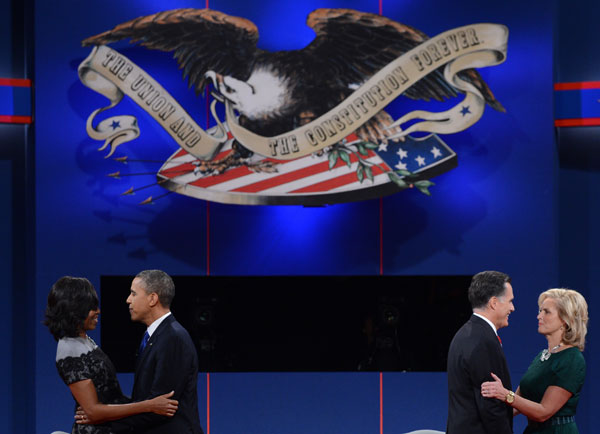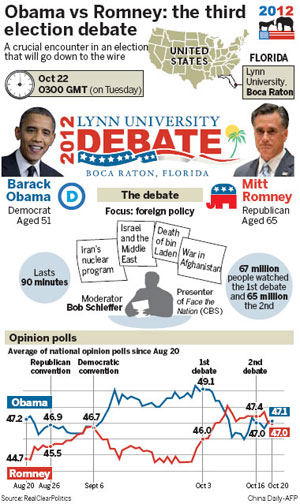US presidential debates click with Chinese viewers
By Cheng Guangjin and Deng Zhangyu (China Daily) Updated: 2012-10-24 07:38Technology makes it easier for overseas audiences to follow race
Shortly after Jon Stewart's The Daily Show poked fun at the US presidential candidates in their second debate and this became available on the Internet, half a million users of Renren, a Chinese social network, had clicked on the link.
This is a growing trend among many Chinese as they watch and discuss the presidential debates.
Technology in the digital era makes it easy for them to keep abreast of latest developments in the election.
 |
|
US President Barack Obama and Republican presidential candidate Mitt Romney welcome their spouses Michelle (left) and Ann to the stage after the final presidential debate at Lynn University in Boca Raton, Florida, on Monday. The showdown, which focused on foreign policy, was held in the critical toss-up state of Florida just 15 days before the election. [Photo/Agencies] |
"The US and China are closely connected in all areas, even in China's territorial disputes with its neighbors. I want to see what the US policy on China will possibly be when the next government is formed," said Sun Shuxian, a coordinator at travel insurance company Allianz Global Assistance.
The third and final debate, in which United States policy toward China was covered, took place on Monday evening in Florida - Tuesday morning for Chinese viewers.
Major Chinese news and video websites, including ifeng and Youku, have carried live webcasts of the debates, or posted video of them afterward.
Some have even been edited with English and Chinese subtitles to cater to a broader Chinese audience.
Websites, forums and blogs have been quick to share transcripts of the debates.
But while watching the debates has become increasingly popular among Chinese, China, for the most part, has come under fire from both US President Barack Obama and his Republican challenger, Mitt Romney.
Sun said: "The US welcomes China when it gains from this, and attacks China when it thinks China constitutes a threat."
"Song-Song" a user of Sina Weibo, China's version of Twitter, wrote: "On the one hand US presidential debates are widely watched in China. On the other, Chinese companies meet obstacles in the US, and Mitt Romey's tough words on China. So this is the role China-bashing plays in this year's US election - a spicy ingredient."
More than 5,000 people took part in an online survey carried by Sina Weibo asking: "Do you think President Obama will be re-elected?", with 70 percent saying they thought he would be.
A search for "US election" on Sina Weibo on Tuesday afternoon turned up 17,400 "tweets", ranking seventh on a list of hot topics of the day. The word "Obama" ranked ninth.
"Mr Zhu Zhi" wrote on Sina Weibo: "We don't have to care too much about what Obama and Romney said in the debates. Whoever is elected will not change the world, or China, too much."
Most of the Chinese viewers hold similar views.
Yang Yanuo, a public relations manager at a Beijing-based company, whose family is living in the US, said she does not think that comments the candidates made in the debates will be fully realized after the election.
"Many people around me and some of my American friends all believe the China-US relationship will be a mutually beneficial one," she said.
Yu Hong, director of the development department of the China Culture Development Association, said his 15-year-old daughter has been following the election as she will study in the US and wants to know what kind of a country it is.
"Many of my friends and colleagues working in the trade and cultural fields have also watched the US election closely," Yu said.
Recently released results of a survey by the Pew Research Center, a US think tank organization based in Washington that provides information on issues, attitudes and trends shaping the country and the world, showed that Chinese have mixed feelings toward the US.
The Chinese public has become more wary of it, while still embracing aspects of US "soft power" including science and technology, the survey found.
Contact the writers at chengguangjin@chinadaily.com.cn and dengzhangyu@chinadaily.com.cn







